Best 4K TVs UK 2022: which smart TV is best? We review ultra HD models from Sony, Samsung, LG, and Currys
This article contains affiliate links. We may earn a small commission on items purchased through this article, but that does not affect our editorial judgement.
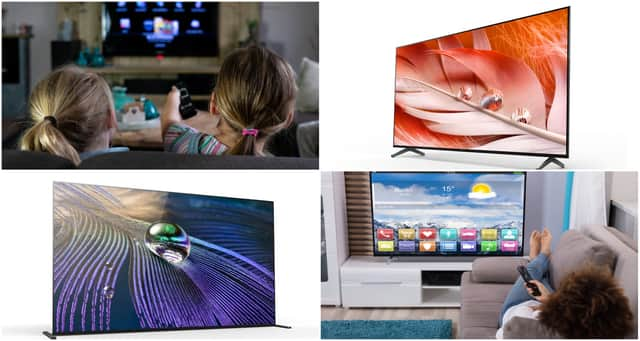

Manufacturers don’t make it easy to find the best 4K or TV to buy in 2022. TV names are strings of seemingly random numbers and letters. The features that distinguish one set from another can seem impenetrable, and rarely tell you the most important stuff.
What should I look for in a new TV?
High contrast and brightness will usually make more of a difference to your experience than some fancy new upscaler algorithm that cleans up ITV daytime TV programmes a bit.
We can help. Below you’ll find a list of some of our favourite 2022 TVs. We’re sticking to the high-end and mid-range models here. If you want a bargain, take a look at our best affordable TV round-up.
Best 4K Ultra Smart TVs at a glance
- Best for a searingly bright picture/ best QLED: Samsung QE55Q80B (2022) QLED
- Best for gamers who want top-tier image quality: LG C1 OLED
- Best all-round OLED: Sony XR-55A90JU
- Best for motion performance: Sony BRAVIA XR55A80JU 55”
- Best for affordable OLED brightness: LG OLED55G1
- Best mid-range OLED: Samsung Q80A
- Best for image quality purists: Panasonic TX-55HZ2000b
- Best for budget buyers: Philips OLED 706
- Best for flexibility: Sony XR55X90JU 55”
Which brand should I opt for?
A list of the best TVs regardless of budget focuses even more on the big names: Samsung Sony and LG being the top three brands in 2022.
But your first decision is whether to buy an OLED TV or an LCD-based one. LCDs include Samsung QLED sets and all but a few Sony models.
OLED or LCD?
OLEDs still offer the deepest, most cinematic picture in a dark room, because each pixel is its own light source. They can be ‘switched off’ independently. The best new LCD sets get close, though, and are usually far brighter. This is important for HDR or daytime viewing, particularly if there are big, bright windows nearby where it will live.
We’ll largely stick to TVs normal people might buy in the round-up below. While some of you might dream of an 84-inch 8K screen, most of us can’t afford one, or the house remodelling it would probably require.
All models are available in several sizes, the quotes prices relating to the 55-inch version, currently the most popular size.
If you find, after purchasing your TV, the sound a little lacking, consider a sound bar for a more cinematic experience.
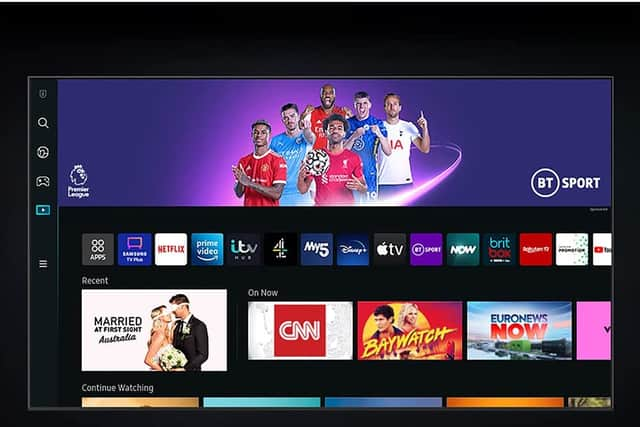

This is one of Samsung’s prioprietry technology QLED Neo TVs, and the best one available at the time of writing. It is fantastic.
Samsung’s aim is to take down rivals with a new kind of technology called mini LED. This lets the TV completely darken small areas of the screen, for more cinematic results in dimly lit rooms.
You still get the incredible brightness of Samsung’s other QLED TVs, though, making this a real “best of all worlds” television.
It’s not cheap, but brightness, colour and contrast are all excellent.
The smart system is great too. Purists may still prefer an OLED TV, but the sheer punchy power of the Samsung QE55Q90Tis hard to beat.
As a plus - it’s fabulous for gaming, too.
Key Specs:
Screen size: 55in, Display Type: QLED, HDR formats supported: HDR10, HLG, HDR10+, Dimensions: 1,228mm x 795mm x 35mm plus stand Operating system: Tizen, HDMI inputs: 4, ARC/eARC: eARC, Optical output: Yes
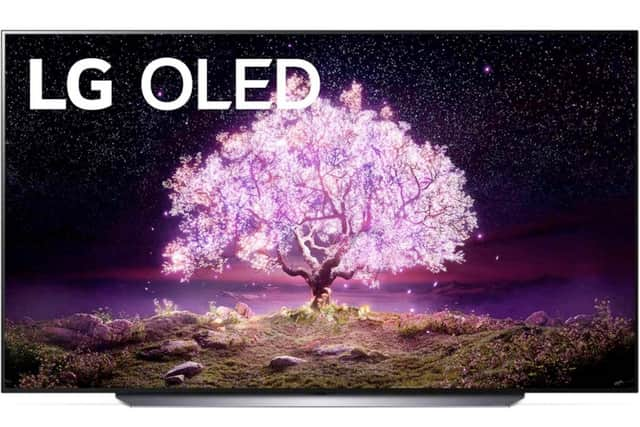

The C1 OLED is our top recommendation for most TV buyers who want pixel-perfect image quality for movie nights, and all the top features Xbox Series X and PS5 gamers demand.
As the name suggests, it’s an OLED TV so can light up individual pixels, resulting in infinite image contrast and perfect blacks.
The LG C1 OLED has a 120Hz max refresh rate and VRR, which lets it sync up when it changes its screen image with a game console or PC.
The price is spot on too, lower than its Sony rival and far lower than OLEDs of a few years ago. You miss out on the slightly higher brightness of LG’s top-end G1 OLED, but we’ll leave it to you as to whether that’s worth an extra £300.
Key Specs:
Screen size:65in (also available in 48in, 55in, 77in, 83in), Type:OLED, Backlight: N/A, Resolution:4K, HDR formats supported:HDR10, HLG, Dolby Vision, Operating system: webOS 6.0, HDMI inputs:4, ARC/eARC:eARC, Optical output :Yes
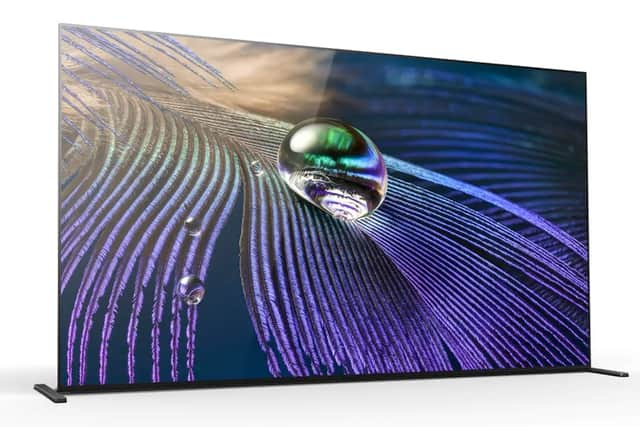

Is this the best OLED TV? Perhaps the best TV, full stop? Quite possibly. The Sony XR-55A90JU is the top 4K Sony TV line.
This actually uses the same panel as the LG G1, complete with greater brightness than you usually get in an OLED TV. The Sony XR-55A90JU uses an extra heatsink to push that brightness even further than the LG G1 too.
Sony also offers superior motion handling, and the Android TV interface lets you ‘Chromecast’ content right from your phone. It’s a killer TV for movies, TV and sport.
However, it lacks a few of the gaming-specific features seen in the LG G1. This is a near-perfect TV as long as you don’t spend half your free time glued to an Xbox Series X or PS5.
The Sony XR-55A90JU’s speakers are well above average too. It’s one of the few sets that lets you get away without buying a soundbar.
Key Specs:
Screen size: 55in (also available in 65in, 83in), Type: OLED, Backlight: N/A, Resolution: 4K, HDR formats supported, HDR10, HLG, Dolby Vision, Operating system: Google TV, HDMI inputs:4, ARC/eARC: eARC, Optical output: Yes.
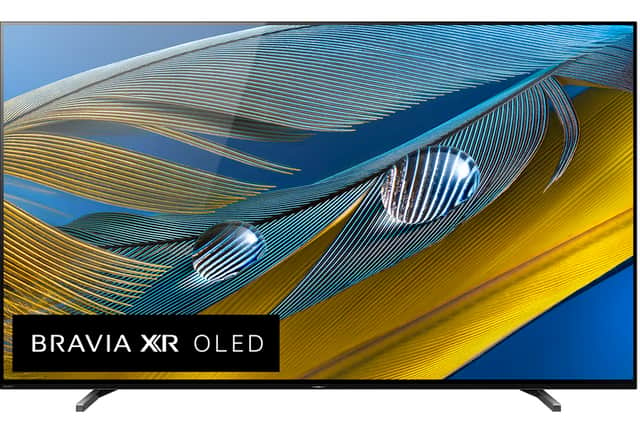

Find the Sony XR-55A90JU several hundred pounds too expensive? You might prefer the Sony XR-55A80JU, a step-down model that comes with a compelling drop in price.
You retain the perfect contrast of an OLED panel, terrific colour and Sony’s renowned motion handling, which should appeal to sports fans and those who love frenetic action films.
What do you lose? The Sony XR-55A80JU has a slightly less advanced display panel, one not quite as bright as the Sony XR-55A90JU’s. And the speaker array is not as powerful. But for the money saved, it’s still a remarkable model.
Key Specs:
Screen size:55in, Type: OLED, Backlight: N/A, Resolution: 4K, HDR formats supported,HDR10, HLG, Dolby Vision, Operating system: Google TV, HDMI inputs:4, ARC/eARC:eARC, Optical output:Yes.


The LG OLED55G1 was LG’s flagship OLED TV for 2021. It marked a leap forward in the brand’s performance - all down to the company’s new Evo panel technology.
It allows for a brighter image, nudging LG’s world-renowned OLED TVs a little closer to the picture power of Samsung’s QLEDs. Extra brightness is useful for HDR video, and any time you watch the TV in a fairly well-lit room.
The LG OLED55G1 is something of an ultimate all-rounder, packed with abilities and features for gamers and the image quality purist.
It’s also a lot more affordable than the Sony XR-55A90JU, which may have slightly better motion handling but lacks a few features PS5 and Xbox Series X owners should want.
Key Specs:
Screen size: 55in (also available in 65in, 77in), Type:OLED, Backlight: N/A, Resolution:4K, HDR formats supported: HDR10, HLG, Dolby Vision, Operating system: webOS 6.0, HDMI inputs:4, ARC/eARC:eARC, Optical output: Yes
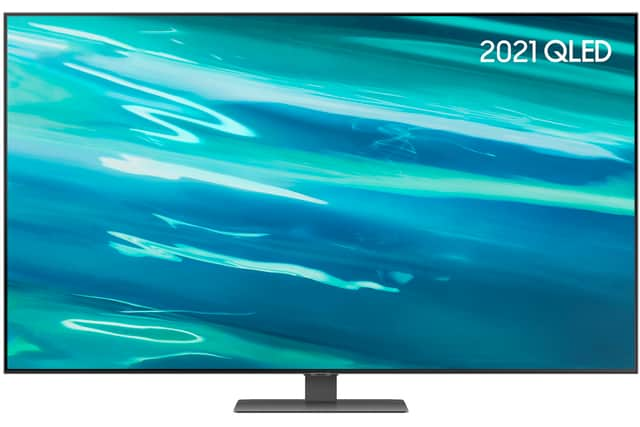

The Samsung Q80A is a mid-range QLED TV, and a great demonstration of why you might want one of these Samsungs over an OLED. It can get extremely bright, even when displaying an image that’s eye-popping across all 55 inches of the screen.
Other TVs at this price we’d recommend, like the LG A1, can’t touch it in this respect. And it lends all kinds of content, from HDR movies to standard definition TV, the sort of vibrancy that can cut through a lot of ambient light.
It’s great for gamers too, as it has low input lag, HDMI 2.1 inputs and supports VRR.
However, it wouldn’t be our first choice for dark cinema-like rooms as this sort of environment will make the Samsung Q80A’s blacks look a little grey-ish.
Key Specs:
Screen size: 55in (also available in 50, 65, 75 and 85-inch), Type: QLED, Backlight: N/A, Resolution:4K, HDR formats supported: HDR10, HLG, Dolby Vision, Operating system: webOS 6.0, HDMI inputs:1, ARC/eARC:eARC, Optical output: Yes
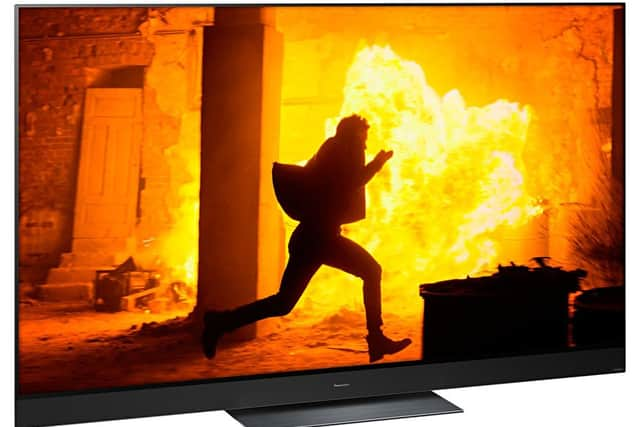

Consider yourself a cineaste? The Panasonic TX-55HZ2000b might be the right choice for you.
It produces the some of the most lifelike images of any TV you can buy thanks to Panasonic’s superlative picture processing. This set also has a large heatsink, which lets the panel push out greater brightness, if not quite at the level of the newer Sony XR-55A90J.
There are two issues. The Panasonic TX-55HZ2000b doesn’t have all of the gamer-friendly features becoming common this year, like VRR (variable refresh rate). And it isn’t cheap.
Key Specs:
Screen size:55in (also available in 65in),Type: OLED, Backlight: N/A, Resolution:4K, HDR formats supported: HDR10, HLG, Dolby Vision, HDR10+, Operating system: My Home Screen 5.0, HDMI inputs:4, ARC/eARC:eARC, Optical output: Yes
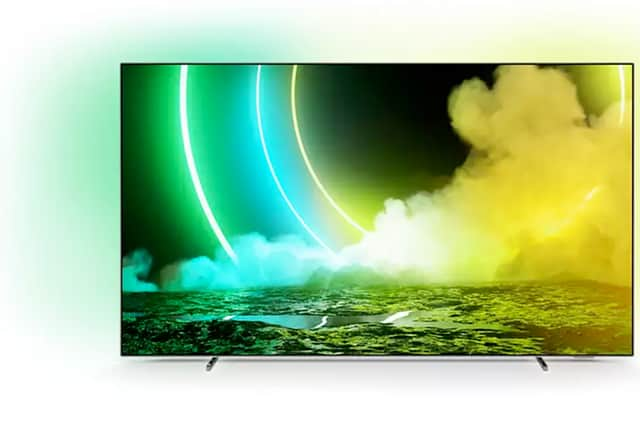

The Philips OLED 706 quietly slipped onto shelves in 2021, and we think it deserves some more attention. It is one of the most affordable OLED TVs, ever, at its ‘recommended’ price.
It’s no stripped-back set, though. You still get Philips’s in-house Ambilight tech, which uses colour LEDs to project light onto the wall behind, matching what’s on-screen.
This can make some content seem more engaging, and it flat-out just looks neat, particularly if your home is already kitted out with smart lights.
The Philips OLED 706 doesn’t have every top-end feature going. Its smart TV interface and picture processing are one step behind.
But at under £1000 this has to be one of the most attractive TV buys around today.
Key Specs:
Screen size:55in (also available in 65in), Type: OLED, Backlight: N/A, Resolution:4K, HDR formats supported: HDR10, HLG, Dolby Vision, HDR10+, Operating system: Android TV 9, HDMI inputs:4, ARC/eARC:ARC, Optical output: Yes
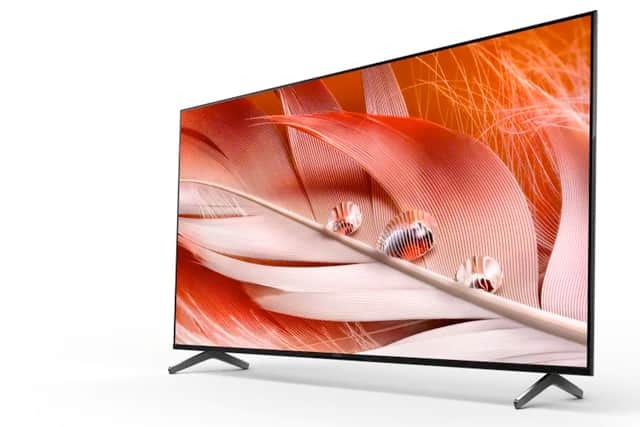

This upper mid-range LCD Sony TV is a good bet if you want extremely good image quality, and will watch content in a whole stack of scenarios.
The Sony X90J is significantly brighter than the OLED sets you can get at the price, handy for daytime viewing.
Sony’s upscaling software is excellent, able to perform wonders with standard def TV programmes. And its motion handling is top-notch.
Blacks won’t appear quite as inky as those of the LG C1 in a dark room, but are likely far better than your current TV’s if you own an older LCD set.
Off-angle viewing and reflections are the only major drawbacks here. Sony’s step-up X95J has a superior filter to improve angles viewing and reflections, but it costs a lot more too.
Key Specs:
Screen size:55in, Type: LCD, Backlight: N/A, Resolution:4K, HDR formats supported: HDR10, HLG, Dolby Vision, HDR10+